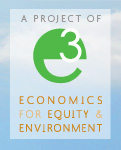A useful new report by Yoram Bauman and the Sightline Institute reveals the deficiencies of many of the best selling economics textbooks in dealing with climate change, arguably one of the most important economic concerns of our time. The report finds that some of the most widely used textbooks present out-of-date accounts of climate science, minimize the economic urgency of the climate crisis, and provide superficial treatment of the real policy challenges inherent to solving the problem.
I wish I could say that I am surprised.
Economics as a whole, despite many notable and important exceptions, still doesn’t get it. The most cited climate economics models in the literature (e.g. Nordhaus’s DICE and Tol’s FUND) still recommend very cautious approaches to emissions reduction. There is a substantial disconnect between economists and scientists regarding climate change, and most of the problem lies in how economists characterize climate change damages. The problem is not that economists don’t understand or accept the science of climate change – most do. It is just that the science, which is characterized by non-linearity, potentially irreversible damages, and uncertainty, doesn’t translate easily into the dollar impacts that standard economic tools use. Admitting this may call into question the appropriateness of these tools to other non-climate applications; perhaps this is why so many economists resist it.
Similarly, economics textbooks tell a neat, clean story about how society can rationalize the allocation of scarce resources to optimize social welfare. Anyone who has taught economics as I have knows just how seductive this tale can be. It might seem a bombshell for students to discover in later chapters that the market system’s failure to price carbon signifies the greatest market failure of all time, that the energy inputs that are so closely tied to economic growth and prosperity threaten to undermine the well being of future generations, and that a precautionary risk-based approach to the climate crisis is preferable given the limitations of fitting climate science into a narrow cost-benefit optimization framework.
Even those textbooks that were awarded high marks by the Sightline report, texts by Collander (the one I always preferred to use), Mankiw, Krugman and Wells, Baumol and Blinder, tend to marginalize the importance of ecological concerns by relegating their treatment to chapters on “externalities” “market failures” or “public goods”. (I discovered when teaching, to my horror, that many faculty skip these chapters in a rush to cover other materials during the semester).
Wouldn’t a better approach to teaching economics situate economic activity in its proper environmental and social contexts? This is the approach of introductory micro- and macroeconomics texts developed by Tufts University Global Development and Environment Institute. In these texts, students still learn all of the standard tools that comprise the economist’s toolbox, but they get a more vigorous understanding of the complexity of real world economies and the ecological and social constraints in which they operate.

